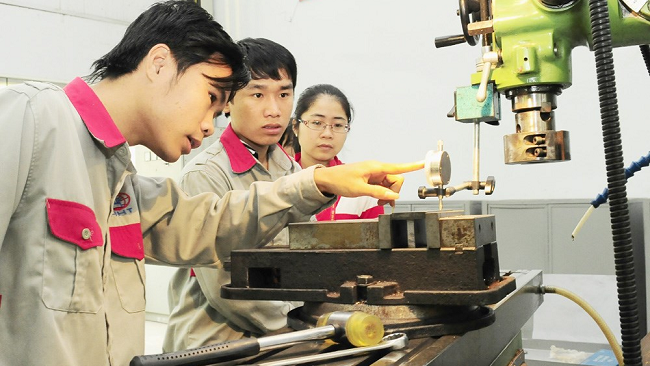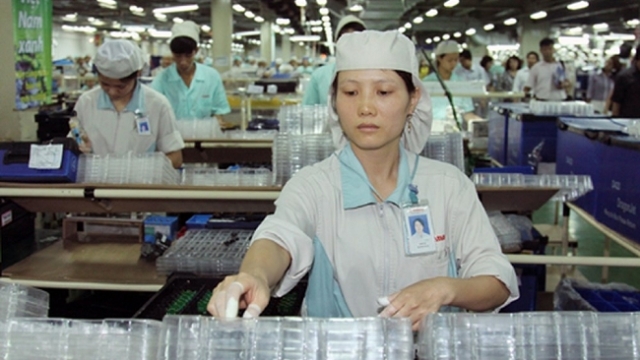Leader Talk
EuroCham recommends reshuffling Vietnam's manpower towards EVFTA
Over 46 million workers have not undertaken specialised training, hence the focus ought to be on upskilling this workforce in preparation for the jobs of the future, especially under the context of Vietnam's deep integration into the world economy.

In recent years, the opportunities and challenges for Vietnam’s workforce when joining multiple Free Trade Agreements (FTAs), especially the upcoming EU - Vietnam Free Trade Agreement (EVFTA) have been talked a lot.
Sharing with TheLEADER, Anh Lan Mai, chairwoman of Human resources and training sector committee under the European chamber of commerce in Vietnam (EuroCham) said that there are a lot of opportunities for Vietnamese in the context of Vietnam’s deeper integration into the world; however, the challenges that Vietnam’s workforce has to overcome in this regard are significant.

According to EuroCham's representative, more FTAs being signed means greater foreign investment in Vietnam and greater use of modern technology. Therefore, Vietnamese labour is increasingly being exposed to advanced technology and learning more about working practices in more developed countries.
FTAs also provide more labour mobility channels regionally and globally; creating new opportunities for Vietnamese labour in prosperous markets.
The EVFTA includes specific provisions on labour commitments in Article 3 of the Trade and Sustainable Development chapter. In signing the EVFTA, Vietnam reaffirms its commitment to the obligations of its membership of the International Labour Organisation (ILO) and the ILO Declaration on Fundamental Principles and Rights at Work. These include freedom of association and effective recognition of the right to collective bargaining.
Therefore, the Government will be obliged to integrate such commitments into its domestic laws. In doing so, it will help to form a more progressive legal framework that better protects the rights and interests of the Vietnamese labour force.
In addition, Vietnam’s workforce should be well prepared to overcome the challenges of integration.
"One Vietnam’s problem, in our opinion, is the quality of education and training. To meet the demands of integration, education and training are in need of a comprehensive overhaul to provide the Vietnamese workforce with the necessary skills for a modern, international environment," said Lan Anh Mai.
However, according to the Global Talent Competitiveness Index 2018 (GTCI), Vietnam ranks 87th out of 119 countries based on landscape, attraction, growth, retention, vocational and technical skills and global knowledge skills. Vietnam’s lowest-ranked category is vocational and technical skills.
Moreover, according to the latest MOLISA Labour Market Update, the proportion of trained labour in Vietnam remains low, accounting for 21.8 per cent of the total workforce.
The representative of EuroCham stated that a majority of Vietnam’s workforce was unskilled labour lacking in technical skills. However, these people often work in low-paid, hazardous jobs; therefore, more FTAs being signed will raise the competitiveness of Vietnam’s labour force compared with those in more developed countries.
In addition, the labour mobility facilitated by FTAs may cause a “brain drain” in which educated and highly skilled labour migrates to better-developed markets in search of a better standard of living, higher salaries and greater access to advanced technology. The Government has yet to issue any effective policies to attract and retain skilled labour.
She said that Vietnamese people are recognised as hard workers and fast learners, and salaries are increasingly competitive. Areas to further improvements include increased focus on compliance levels, language, and soft skills, especially in team-working and project management.
In reality, several foreign-owned enterprises have voiced their concerns regarding Vietnamese employees’ linguistic proficiency, causing internal communication troubles.
How to unlock the problem?
In order to address those challenges, EuroCham's vice-chairman of Human resource & training sector committee Khuat Van Trung said that the Government and Vietnam’s enterprises should come up with concrete roadmaps to overcome these barriers in order to quickly adapt, integrate into the world economy and affirm the position of the Vietnamese workforce in the international arena.
The Government should reform and establish a complete set of policies with respect to education and training based on the national qualifications framework under Decision 1982/QD-TTg issued by the Prime Minister on October 19, 2016. It should also establish national standards for vocational and soft skills in accordance with the country's needs and regional and international trends.
The Government and authorities ought to continue to provide more and further improved training to strengthen the quality of its workforce. This can be achieved by adopting liberal policies and a legal framework aimed at enabling and incentivising the private sector to more actively providing vocational training services, such as opening high-quality educational institutions in Vietnam.
Private sector involvement also implies effective cooperation between institutions and enterprises to minimise unemployment due to the supply-demand discrepancy.
Besides, the Government should enhance bilateral and multilateral cooperation with more developed countries in terms of scientific research, academic exchanges and training for teachers, professors, and administrators in the education and training industry.
In addition, Trung said that the Government and Vietnamese enterprises should focus on producing a labour demand forecast that is both profession-specific and qualification-specific. Such a forecast will be very helpful for timely adjustments responding to socio-economic changes that happen from time to time.
Improving labour conditions including eliminating forced and child labour, workplace discrimination, environmental degradation to meet the commitments Vietnam has made in its FTAs is essential. Addressing these commitments on the ground level will help to increase labour efficiency and productivity.
Trung said that enterprises also play a significant role in improving labour quality. They should organize regular workshops, actively praise employees so that they feel valued, and encourage their employees to learn new skills to adapt to future changes.
Regarding the so-called “brain drain”, enterprises need to understand that for skilled, highly-qualified workers, salary, compensation and other benefits are no longer their top priority. Their attention has gradually shifted to training and career development opportunities.
In the context of the fourth industrial revolution, representatives of EuroCham said that Vietnam can’t rely on its low cost and abundant labor force to maintain its competitiveness and attract foreign investment. Over 46 million workers have not undertaken specialised training, hence the focus ought to be on upskilling this workforce in preparation for the jobs of the future.
It is of utmost importance to prepare and equip workers with necessary skills (vocational skills, foreign languages, career orientation, etc.), as trained labour will be the main driving forces for the Vietnamese economy.
"The Government and businesses should also conduct regular campaigns to raise awareness of the fourth industrial revolution, a term unknown among most ordinary workers, and of the need to change attitudes, to become proactive and to cooperate with their employers in improving their hard and soft skills," said the representative of EuroCham.
Workers over 35 years old at foreign invested firms face vulnerability of layoff
Vietnam turns semiconductor vision into action
The global semiconductor industry is being reshaped by geopolitical tensions, shifting supply chains, and the surge of digital technologies.
Cutting red tape in APA approvals to speed up tax negotiations
The change in APA approval authority is expected to shorten processing time and enhance business proactiveness in international tax negotiations.
Enterprise cybersecurity is under threat from the inside
As hybrid cloud systems grow more complex, Vietnamese enterprises are struggling to detect cybersecurity threats moving laterally within their own networks.
Breakthrough for the international financial center ambition
The submission of the draft resolution on Vietnam’s international financial center to the National Assembly heralds a new developmental era for the country.
How leadership philosophy redefines hospitality in Nha Trang
More than just running a 5-star resort, Kristian Petersen is redefining the art of hospitality with a humane and sustainable leadership philosophy.
When organic becomes an inspiring wellbeing lifestyle
For Tyna Huynh, co-founder of Drinkizz, organic is not just a food choice but a way of life that fosters a deep connection between people, nature and community.











































